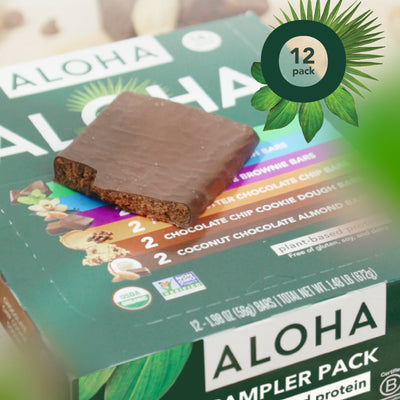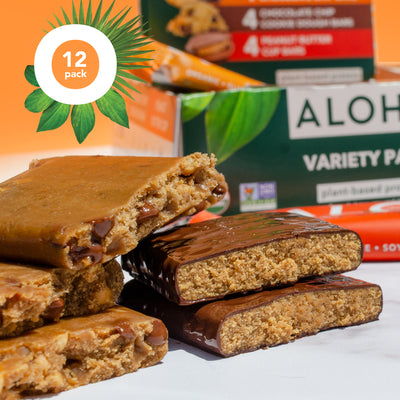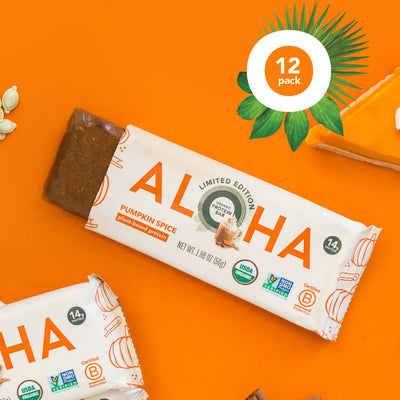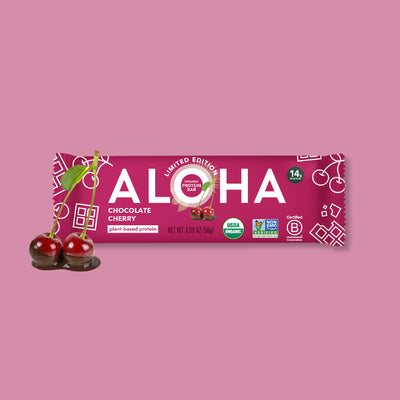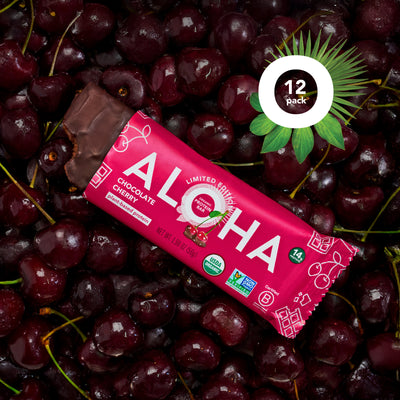Key Takeaways:
- Calories Vary by Type and Ingredients: Protein shakes range from 100-250 calories depending on ingredients like protein sources, sweeteners, and added nutrients.
- Plant-Based Shakes Offer Balanced Nutrition: Plant-based protein shakes are typically around 160-200 calories, providing fiber, healthy fats, and essential nutrients.
- Low-Calorie Shakes Require Smart Choices: Choosing shakes with clean, simple ingredients and avoiding added sugars ensures a healthy, calorie-conscious option.
At ALOHA, we’re all about making nutrition simple and approachable. With organic, plant-based protein shakes, we bring the perfect blend of nutrition and flavor to support every step of your wellness journey.
Understanding the calorie content of protein shakes is essential for making informed dietary choices. Factors such as ingredients, serving sizes, and sweeteners can significantly influence the calorie count of these beverages. By being mindful of these elements, you can select protein shakes that align with your health objectives.
In this guide, we’ll break down the calorie content of protein shakes to help you understand how they fit into your lifestyle. Whether you’re looking to fuel a workout or manage your daily nutrition, we’ll help you choose options that support your goals without sacrificing taste or simplicity.
What Factors Affect The Calorie Count In Protein Shakes?
The calorie content of a protein shake is shaped by the ingredients that go into it. Whole, plant-based ingredients like nuts, seeds, and coconut milk contribute natural fats, raising the calorie count while providing essential nutrients. On the other hand, protein shakes with artificial fillers or low-quality protein sources might have fewer calories but lack nutritional value, making ingredient quality a key factor.
Serving size is another significant contributor to calorie variation. A larger portion naturally contains more calories, even if the ingredients are nutrient-dense. Sweeteners and flavorings also play a role, with options like sugar or syrup adding extra calories compared to naturally sweetened or unsweetened alternatives. These elements determine how a protein shake fits your dietary needs and goals.
Calorie Breakdown Of Popular Protein Shakes
Understanding the calorie breakdown of protein shakes can help you make smarter choices tailored to your goals. Whether you prefer plant-based options, whey protein, or specialty blends, the calorie range depends largely on the ingredients, sweeteners, and added nutrients. Let’s look into the most common types and what influences their calorie counts:
Plant-Based Protein Shakes
Plant-based shakes typically have 160-200 calories per serving. They often include nutrient-rich ingredients like coconut milk or pea protein, which contribute healthy fats and fiber. This makes them great for those seeking a balanced, organic option that aligns with wellness goals.
Whey-Based Protein Shakes
Whey protein shakes usually fall between 100-250 calories per serving. While they’re known for their high protein content, they often include added sugars or oils that can increase calorie counts. This option is common among fitness enthusiasts looking for a quick muscle recovery solution.
Low-Calorie Protein Shakes
Low-calorie shakes, often under 150 calories, cater to those focused on weight management. They may use artificial sweeteners and smaller portion sizes to reduce calories but sometimes compromise on nutrient density. This makes them ideal for calorie-conscious consumers but less suitable for those prioritizing whole food ingredients.
Premium Or Specialty Blends
Specialty shakes with added benefits, such as omega-3s, prebiotics, or probiotics, can range from 180-300 calories. These options are designed to offer more than just protein, targeting overall health and wellness. While they might have higher calorie counts, they provide additional nutritional value that supports long-term goals.
How To Choose A Low-Calorie Protein Shake
Finding the right protein shake that aligns with your calorie goals doesn’t have to be complicated. The key is to focus on shakes with simple, high-quality ingredients and avoid unnecessary additives that might inflate the calorie count. Let’s explore how to make a smarter choice:
Check The Ingredients List
Look for protein shakes made from whole, recognizable ingredients like plant-based proteins, almond milk, or coconut milk. Avoid shakes with added sugars, syrups, or artificial fillers that contribute empty calories. A clean ingredient list keeps calories in check and ensures you nourish your body with quality nutrition.
Prioritize Protein-To-Calorie Ratio
A good protein shake offers a high amount of protein for relatively few calories. Depending on your needs, aim for options with at least 15-20 grams of protein per serving while keeping total calories under 200. This balance helps you feel full and fuels your body efficiently without overloading calories.
Consider Sweeteners And Flavors
Natural sweeteners like monk fruit are lower in calories than sugar or syrups, making them a great choice. Be cautious of heavily flavored shakes that might add hidden calories through sweeteners and thickeners. Opt for naturally flavored options, such as vanilla or chocolate made with organic cocoa, for a lighter and healthier option.
Homemade Vs. Store-Bought: Which Is Better For Calorie Control?
When it comes to protein shakes, both homemade and store-bought options have their pros and cons for calorie control. Homemade shakes give you full control over ingredients, but store-bought options like ALOHA offer convenience without sacrificing quality. Let’s take a closer look at how these compare:
Benefits Of Homemade Shakes
Homemade shakes allow you to customize ingredients to fit your dietary goals perfectly. You can control the calorie count by choosing whole, low-calorie ingredients like almond milk or unsweetened fruits. However, preparing them can be time-consuming, requiring planning and fresh ingredients.
Advantages Of Store-Bought Shakes
Store-bought protein shakes offer a grab-and-go solution for busy lifestyles. Brands like ALOHA prioritize transparency and use organic, plant-based ingredients to keep calories in check while delivering balanced nutrition. These options are great for those who value convenience and consistent portion sizes.
Which One Fits Your Goals?
Choosing between homemade and store-bought shakes depends on your lifestyle and priorities. If you enjoy experimenting in the kitchen and want complete control, homemade is ideal. Store-bought shakes are a practical choice for those who need quick, reliable options with thoughtful calorie design.
Calories And Nutritional Values In Plant-Based Protein Shakes
Plant-based protein shakes are an excellent choice for health-conscious individuals looking to balance nutrition and calorie intake. They are typically lower in saturated fats and offer additional benefits like fiber and essential nutrients. Let’s break down what makes these shakes stand out:
Lower Saturated Fats
Unlike dairy-based options, plant-based protein shakes are cholesterol-free and low in saturated fats. Ingredients like coconut milk or pea protein contribute healthy fats that support heart health without significantly increasing calories. This makes them ideal for managing fat intake while maintaining a nutritious diet.
Rich In Fiber And Nutrients
Plant-based shakes often include oats or almond milk, adding fiber and essential vitamins. Fiber supports digestion and helps with satiety, making these shakes a great option for staying full longer. This nutrient boost adds value beyond just protein content.
Sustainable And Allergy-Friendly
Made from plant sources, these shakes are often easier to digest and free from common allergens like lactose. Plant-based shakes offer a versatile and inclusive option for individuals with dietary restrictions or preferences. Plus, they align with sustainable, environmentally friendly practices.
How Activity Levels And Goals Influence Your Protein Shake Choice
Your activity level and wellness goals greatly determine the best protein shake for your needs. Whether you’re an athlete aiming for muscle recovery or maintaining a balanced diet, the right shake can help you stay on track. Here’s how to align your choice with your lifestyle:
For Active Individuals
If you regularly work out, a protein shake with 20-25 grams of protein and moderate calories (around 180-250) is ideal. These shakes help repair muscles and replenish energy without overloading them with unnecessary calories. Post-workout shakes are especially effective for recovery and maintaining muscle health.
For Weight Management
Low-calorie shakes (under 150 calories) with a high protein-to-calorie ratio are best for those focusing on weight control. They help curb hunger without adding excessive calories. Pairing these shakes with healthy snacks ensures you feel satisfied while sticking to your calorie goals.
For General Wellness
If your goal is overall wellness, choose a shake that balances protein, fiber, and essential nutrients. Look for plant-based options with clean ingredients to support long-term health. These shakes supplement a balanced diet rather than a full meal replacement.
Final Thoughts
Choosing the right protein shake is more than just a dietary decision—it’s a step toward aligning your nutrition with your lifestyle and wellness goals. The calorie content in a shake reflects more than just a number; it speaks to the quality of the ingredients, the balance of nutrients, and the intentionality behind its formulation. Understanding these factors empowers you to make choices that support your health and fit seamlessly into your daily routine.
Whether you lean toward plant-based options for their clean, natural benefits or prioritize low-calorie shakes for weight management, the key is finding a product that resonates with your values and needs. Protein shakes should nourish and energize you, not complicate your diet or detract from your goals. With thoughtful selection, they can be a reliable companion in your journey toward better health, offering simplicity, convenience, and satisfaction in every sip.
Read also:
- Plant Based Diet vs. Vegan
- Vegan Diet For Weight Loss: How It Can Help Shed Pounds
- Mediterranean Diet vs. Vegan
Frequently Asked Questions About How Many Calories In A Protein Shake
Are protein shakes high in calories?
Not all protein shakes are high in calories; it depends on the ingredients and serving size. Many plant-based options are balanced at around 150-200 calories.
How can I reduce calories in my homemade protein shake?
You can lower calories using unsweetened almond milk, water, or low-calorie fruits like berries. Avoid adding sugars, syrups, or calorie-dense fats.
Are all low-calorie protein shakes healthy?
Not necessarily—some low-calorie shakes use artificial sweeteners or fillers that may not provide nutritional benefits. Always check for clean, natural ingredients.
Do protein shakes cause weight gain?
Protein shakes themselves don’t cause weight gain; it depends on your total calorie intake. They can be part of a balanced diet when consumed appropriately.
Are plant-based protein shakes better for calorie control?
Plant-based shakes often have a balanced calorie content and are free of saturated fats. They also provide fiber and essential nutrients that support overall wellness.
Can I replace a meal with a protein shake to manage calories?
Yes, but it’s best to pair your shake with nutrient-dense foods like fruits or vegetables. This helps keep you full and ensures you get a variety of nutrients.
Do flavored protein shakes have more calories?
Some flavored protein shakes contain added sugars or syrups, which increase calorie counts. Opt for naturally flavored options to keep calories in check.
Are protein shakes good for a low-calorie diet?
Protein shakes can be great for a low-calorie diet if chosen wisely. Look for options with fewer than 150 calories per serving and minimal added sugars.
What is the average calorie content of protein shakes?
Most protein shakes range from 100-250 calories per serving, depending on the type and brand. Plant-based options are typically around 160-200 calories.
Can protein shakes fit into any dietary goal?
Yes, protein shakes can be tailored to fit various dietary goals, from weight loss to muscle gain. The key is choosing one that aligns with your calorie and nutritional needs.
Sources:
1. Fructuoso, I., Romão, B., Han, H., Raposo, A., Ariza-Montes, A., Araya-Castillo, L., & Zandonadi, R. P. (2021). An Overview on Nutritional Aspects of Plant-Based Beverages Used as Substitutes for Cow’s Milk. Nutrients, 13(8), 2650. https://doi.org/10.3390/nu13082650
2. Gallagher, A. M., Ashwell, M., Halford, J. C. G., Hardman, C. A., Maloney, N. G., & Raben, A. (2021). Low-calorie sweeteners in the human diet: scientific evidence, recommendations, challenges and future needs. A symposium report from the FENS 2019 conference. Journal of Nutritional Science, 10. https://doi.org/10.1017/jns.2020.59
3. Ballini, A., Charitos, I. A., Cantore, S., Topi, S., Bottalico, L., & Santacroce, L. (2023). About Functional Foods: The Probiotics and Prebiotics State of Art. Antibiotics, 12(4), 635. https://doi.org/10.3390/antibiotics12040635
4. Pesta, D. H., & Samuel, V. T. (2014). A high-protein diet for reducing body fat: mechanisms and possible caveats. Nutrition & Metabolism, 11(1), 53. https://doi.org/10.1186/1743-7075-11-53
5. Lee, P. Y., Leong, S. Y., & Oey, I. (2024). The role of protein blends in plant-based milk alternative: A review through the consumer lens. Trends in Food Science & Technology, 143, 104268. https://doi.org/10.1016/j.tifs.2023.104268
6. Xie, A., Dong, Y., Liu, Z., Li, Z., Li, M., Liang, X., & Yue, X. (2023). A Review of Plant-Based Drinks Addressing Nutrients, Flavor, and Processing Technologies. Foods, 12(21), 3952–3952. https://doi.org/10.3390/foods12213952
7. El Sadig, R., & Wu, J. (2024). Are novel plant-based meat alternatives the healthier choice? Food Research International, 183, 114184. https://doi.org/10.1016/j.foodres.2024.114184
ALOHA's products are not intended to treat, diagnose, mitigate, prevent, or cure disease. ALOHA's products should not replace prescribed medications or the variety of foods important to a healthful diet.
Do not self-diagnose any health condition. Work with your healthcare provider to determine how best to achieve optimal health.





